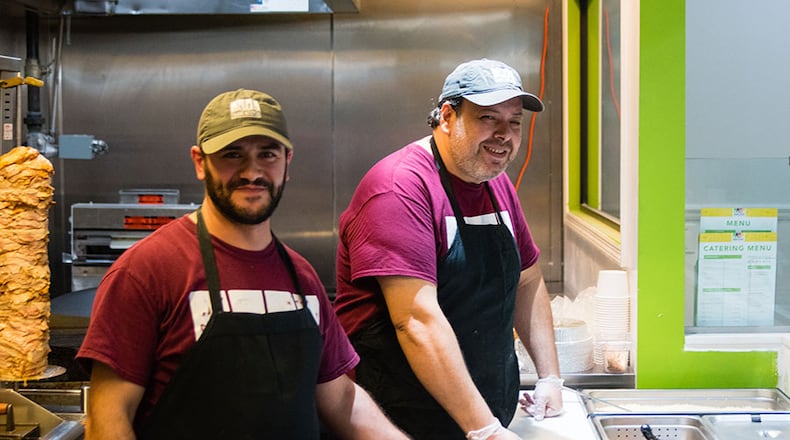Sept. 17, 1990. June 14, 2016. Oct. 4, 2016.These dates hold little meaning for most people, but for a group of local Syrians, each date marks a new chapter, a new beginning.
Every fourth Thursday of November, Americans express gratitude for family, health, life, among other things. For Abe Malla, Hesham Alahmad and Mohamad Gehad Aldarra, the date that they stepped onto U.S. soil after fleeing a war-torn country is one that is filled with great thanks.
Now working together with other Syrian refugees at Shami Kitchen, Malla’s new restaurant at 8363 Roswell Road in Sandy Springs, these men, share a commonality deeper than their birthplace. They share similar journeys and stories of coming to a country that offered hope for a better life.In Arabic, the term “Shami” references people from Damascus. Nearly three decades after coming to the U.S., Malla is helping his displaced countrymen find their way.
Abe Malla
It was the year 1990 when Abe Malla walked off a plane with his parents and four brothers to start over in Atlanta as a 17-year-old.
“A lot of us don’t know how good we got it,” Malla, 45, said as he reflected on the last 27 years.
His father, Mahmoud Malla, worked as an attorney in Damascus, the capital city of Syria. In Atlanta, Mahmoud’s first job would be far more humble. His paycheck to take care of his family came from working at a dollar store, later at Dillard’s department store, and then finally as the owner of a Middle Eastern grocery store in Lilburn.
Abe would follow the same entrepreneurial path of his father, who died two years ago.
Despite knowing no English when he arrived in Atlanta, Abe graduated a year later from Riverwood High School in Sandy Springs. He then enrolled at Georgia State University, but never graduated. Instead, he opened Designer Rugs in Buckhead in 1994. Malla has been his own employer ever since.
In 2013, he launched a furniture company called Westside Market and, this past summer, he unlocked doors to Shami Kitchen, a fast-casual Mediterranean restaurant on Roswell Road.
“I have no restaurant experience,” he confesses. But it’s a dream that had been tugging at him for 10 years.
The employees that worked at Shami Kitchen when it first opened this summer came from myriad backgrounds.
Since then, the staff has come to be comprised almost entirely of Syrian refugees.
He has no illusions that success will be easy.“The restaurant business is hard, just like any business,” he said.
Ismail Alismael
In 2012, Ismail Alismael left his wife and their three young children in Damasus in search of better opportunities in Turkey. After a five-month separation from his family, he returned, they packed their belongings and made a temporary home in Turkey. After a 22-month application process, Alismael and his family were granted entry to the U.S. They arrived this past April.
A baker by trade, Alismael’s primary responsibility at Shami Kitchen is to make saj, the tortilla-like bread used for wraps.
“I came for the future of my kids,” said Alismael, 37.
The couple’s fourth child, a son, was born Nov. 6.
He expressed thanks for “very good schools” that his children attend in Clarkston.
This is Alismael’s first Thanksgiving in America so he was not familiar with the tradition. When the holiday was described to him, he said that big family gatherings were very common at one time in his life. Now, his parents and five of his siblings reside in Turkey. One brother remains in Damascus.“I miss the whole family getting together, spending time together,” he said.
Hesham Alahmad
Hesham Alahmad, age 34, easily recalls the exact date that he passed through U.S. customs in Miami. It was June 14, 2016.
He and his wife, Hnadi, have six children. The oldest is a 10-year-old daughter. The youngest is a set of 4-month-old twins.
Before making their home in Clarkston, home for the Alahmad family was Homs, a city in western Syria and site of heavy fighting in opposition to the government led by Bashar al-Assad. In 2012, Alahmad left behind the candy company that he owned, and the family fled to Jordan, where he found work helping a friend who owned a cell phone repair business.
Alahmad’s first job in Atlanta was on the housekeeping staff at the Hilton hotel downtown. Later, he worked five months for Pizza Hut before a fellow Syrian told him about job opportunities at Shami Kitchen.
At the restaurant, Alahmad “does everything,” he said, but the English he picked up through music and movies is good enough to qualify him to take customer orders at the counter. Interacting with guests allows him to enjoy what he considers one of the best aspects of life in America — smiling.
“People here smile,” Alahmad said. “They are happy.”
Samer Tammour
Samer Tammour, 34, is also from the Syrian rebel city of Homs. He worked as a welder there for nearly 10 years before violence forced his family to flee to Jordan. After three years there, he and his family were granted entrance to the U.S. and have resided in Clarkson for nearly the same length of time.
Like others at Shami Kitchen, it was word of mouth from fellow Syrian refugees that brought Tammour to Shami.
Until setting foot in the States, he had never worked at a restaurant — although at home, he is the family cook, he said.
Tammour’s parents, his two brothers and a sister have all now resettled in metro Atlanta. However, on Thanksgiving Day, Tammour, his wife and children will gather at the home of a neighbor to celebrate Thanksgiving for the first time.
“For Syria, there is no safety now,” Tammour said. “You live for safety. Here, it is good.”
Mohamad Gehad Aldarra
When asked how long he has lived in Atlanta, Mohamad Gehad Aldarra responded with a question. “What is today?”It was Nov. 8.
“I have been here one year and four days,” the 43-year-old replied with the same surety and swiftness that one recites a home address or birthday.
Like his Shami Kitchen co-worker Hesham Alahmad, at one time, Aldarra, who goes by the nickname M Jay, owned a candy company in Damascus. He abandoned that for a manufacturing job that saw him travelling back and forth to Saudi Arabia for nearly a decade while his wife took care of their family in Darayya, a suburb of Damascus.
The Aldarra family fled Darayya five years ago. “It’s torn down. Gone from the war,” he said of his house. “Everything is gone.”
Aldarra, his wife and their three children (now ages 8, 15 and 18) lived in Shorouk, Egypt, for three and a half years before coming to the U.S. last year and settling in Duluth.
Aldarra credits Malla, who is his cousin, for encouraging him to resettle in the U.S.
“When I asked him (Malla), he said, ‘You can come here,” Aldarra said. “All the people can help you.’”
Aldarra hopes to emulate his cousin and give back by starting a business of his own again.
Abud Alhalabi
Helming the kitchen at Shami is Abud Alhalabi. Chef Abud, as he is known at the restaurant, arrived in Atlanta just a year ago with his wife and their two daughters, now ages 14 and 11.
The Alhalabi family departed Damasus for Guangzhou, a city outside of Hong Kong in 2007. There, Abud worked as a manager for C’est La Vie Couture, a company that makes evening gowns.
After graduating from high school, Alhalabi worked in the two restaurants his family owned in Damascus. A mutual friend connected Alhalabi, now 41, and Malla, who was in need of someone to run culinary operations at Shami Kitchen. The pair began working together this past April to turn the long-unoccupied space in the shopping plaza at Roswell and Northridge roads into a bright, airy eatery offering Mediterranean salads, wraps and meze-like sides.
The falafel, the hummus, the shawarma, the pickled vegetables – despite being labeled “Mediterranean, is “how we made it over there,” Alhalabi said.
At the restaurant, entrees like the Shami Kitchen Way chicken wrap that features only chicken, garlic paste and pickled cucumber or the Shami-style beef wrap with onions, parsley, diced tomato and tahini are a few of the Damascus-style street food offerings. Two desserts – the harissah (a cake made from semolina) and the rice pudding – are recipes from his brother, who was the pastry chef at the family’s restaurants.
Does he miss Damascus? Syria? “Of course. It is my city, my country. But to go back there? No.”
Actions speak louder than words
There is one other Syrian on staff at Shami Kitchen. His name is Marwan, and he declined to give his last name.
Marwan is deaf.
According to Malla, Marwan and his wife arrived in Atlanta two years ago. During that time, Marwan was unable to find a job because of his hearing disability. Malla and Chef Abud solved the communication problem with the purchase of a simple dry erase board. On it, they wrote in Arabic all the tasks that Marwan would be asked to do in the back kitchen at Shami. When a job needs to be done, they point to it on the board and Marwan quietly goes about his business.
That’s the Shami Kitchen Way.
About the Author
Keep Reading
The Latest
Featured











